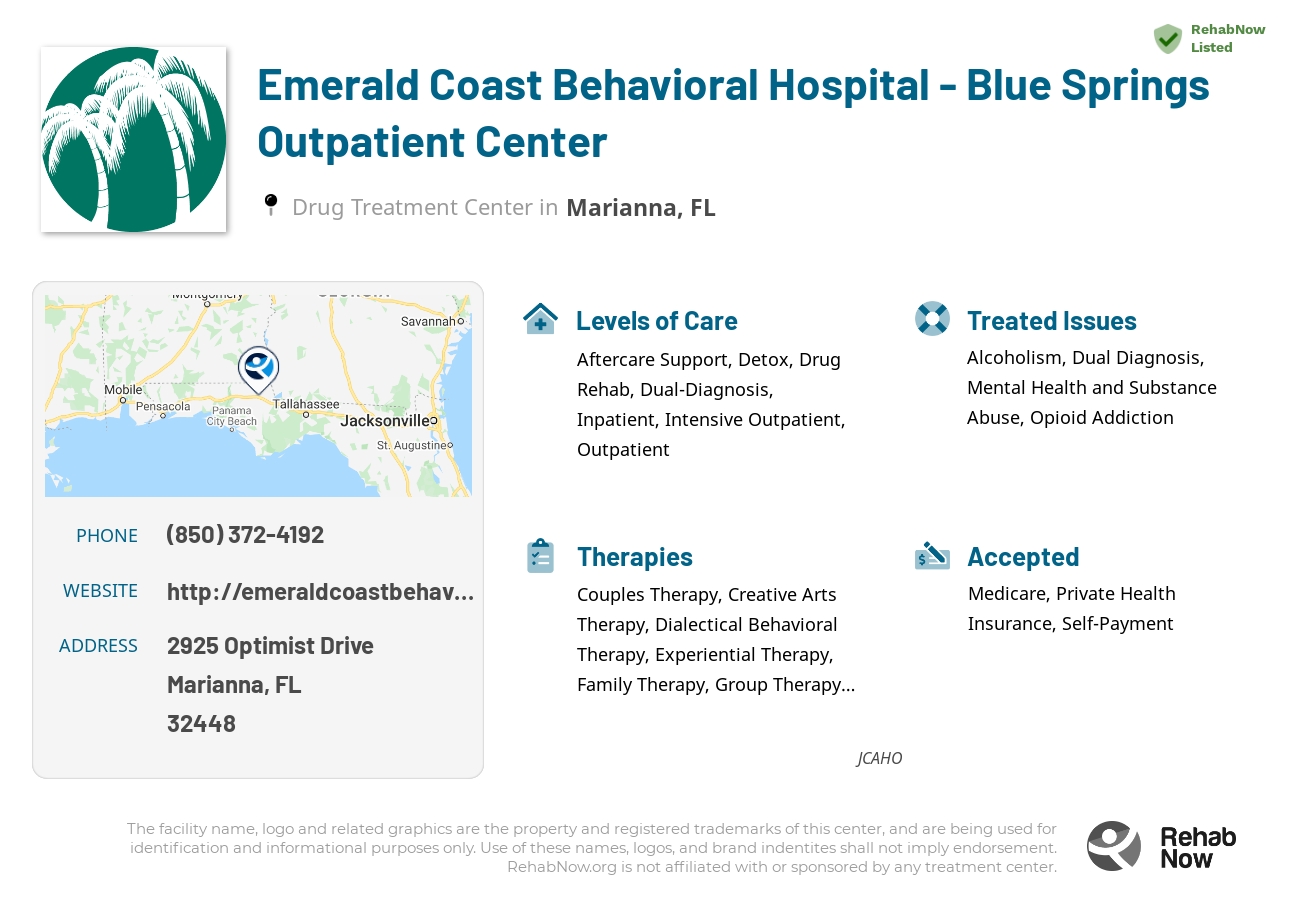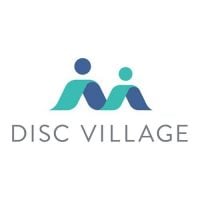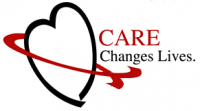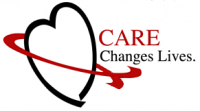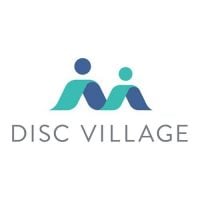Emerald Coast Behavioral Hospital - Blue Springs Outpatient Center
Drug Rehab Center in Marianna, Florida
The Emerald Coast Behavioral Hospital - Blue Springs Outpatient Center is an accredited rehab facility in Florida that offers Aftercare Support, Detox, Drug Rehab, Dual-Diagnosis, Inpatient, Intensive Outpatient and Outpatient Levels of Care with private health insurance acceptance and is accredited by the Joint Commission on Accreditation of Healthcare Organizations (JCAHO).
About Emerald Coast Behavioral Hospital - Blue Springs Outpatient Center in Florida
Emerald Coast Behavioral Hospital - Blue Springs Outpatient Center, situated in Marianna, Florida, stands out by providing psychiatric treatment and mental health services tailored for children, adolescents, adults, including active duty service members, their families, and Veterans. This facility is notable for its comprehensive approach to care, extending beyond traditional psychiatric services to address substance abuse and addiction issues.
Accredited by the Joint Commission on Accreditation of Healthcare Organizations (JCAHO), the center ensures a high-quality, comprehensive approach to recovery. Its connection with Emerald Coast Behavioral Hospital enhances its capabilities, offering a wide range of services from detox to aftercare, tailored to meet each patient's unique needs.
- Offers specialized services for a broad audience including children, adolescents, adults, and military personnel.
- Provides a comprehensive range of care levels, from inpatient and outpatient services to intensive programs and aftercare support.
- Accepts private health insurance, making essential mental health and substance abuse treatments accessible to more individuals.
The center addresses critical issues such as alcoholism, dual diagnosis, opioid addiction, drug addiction, and other substance abuse disorders. With an array of treatment methods including detox services, dual-diagnosis programs, and both inpatient and outpatient care, Emerald Coast Behavioral Hospital - Blue Springs Outpatient Center offers personalized pathways to recovery.
Genders
Ages
Modality
Additional
Accreditations

JCAHO
Conditions and Issues Treated
Some addicts can benefit from substance abuse treatment, which is designed to help them become and remain sober without the use of medications. These programs are typically used by those struggling with drugs like marijuana or hallucinogens. However, they might be beneficial for those with a co-occurring mental health disorder like schizophrenia, major depression or bipolar disorder.
During this type of treatment, the addict will meet with therapists and other professionals on a regular basis to learn coping skills and healthy ways to deal with their addiction and mental health disorder.
Treatment programs often combine medications with counseling, support groups and even medical services like those found in hospitals or doctor’s offices. There are also detoxification services that addicts can use to get sober and avoid severe withdrawal symptoms.
Opioids are a group of drugs that include substances such as heroin, morphine, and oxycodone. These drugs activate opioid receptors in the brain, which produce pleasurable feelings. Opioid addiction occurs when drugs are abused at increasing rates or increasing amounts because the body becomes tolerant of them.
Opioid addiction is typically diagnosed when drug abuse becomes a typical behavior that interferes with an individual’s ability to function daily. The use of the substance results in consequences like legal problems.
Treatment for opioid addiction varies depending on each individual’s needs. Some treatments focus on replacing opioids with other drugs that have similar effects of reducing withdrawal symptoms. Other treatments aim to reduce the risk of relapse by providing psychological support or using more natural methods.
A drug rehab center that uses Dual Diagnosis is more likely to be successful in rehabilitating a person. Dual diagnosis helps to identify and treat any co-occurring disorders. It is essential to screen for both addiction and any untreated mental health issues. A dual diagnosis gives rehab the means to treat addiction while restoring mental and emotional health.
About 70% of patients with drug addiction have at least one other psychiatric diagnosis. Fortunately, dual diagnosis treatment is a proven model that has been highly effective.
Levels of Care Offered
This center offers a variety of custom treatment tailored to individual recovery. Currently available are Aftercare Support, Detox, Drug Rehab, Dual-Diagnosis, Inpatient, Intensive Outpatient, Outpatient, with additional therapies available as listed below.
Detox, or detoxification, is the method of weaning a person’s body from the toxic substance(s) they have abused. This is a slow process under medical supervision and one that should occur for almost all individuals. As detox can cause medical complications, it should always be performed by experienced medical professionals in a safe setting.
Inpatient rehab means you live there while your addiction or co-occurring disorder is treated. Prescribed medications are used along with counseling.
This type of rehabilitation provides a drug-free environment for people who struggle with chronic/long-term addiction (or their own home). Jobs or school can be put on hold until after the stay to focus solely on recovery.
An intensive outpatient program is usually the first phase of addiction treatment. It provides relief for those addicted, but not ready to commit to an inpatient setting. IOPs consist of a daily 3 to 5-hour program, and there is a required number of hours per week. The goal here is to teach patients healthy coping skills, such as stress management.
Outpatient programs offer a lower intensity level of addiction treatment than inpatient facilities. They are ideal for those who have graduated from inpatient facilities, have a supportive home environment, and are motivated to commit to the program. Services offered include medication-assisted treatment, individual and group therapy, and peer group support.
This treatment is a popular option for those suffering from a lower intensity addiction. It is not advisable for someone who needs to go through a medically supervised detox or does not have a supportive home environment. It requires motivation and dedication to commit to the program without constant monitoring.
Aftercare Support in drug rehab is crucial because it helps people stay sober after treatment. Aftercare Support in drug rehab is helpful because it provides the recovering person with a support group, including family members, friends, and other peers who are also in recovery.
The benefits of Aftercare Support are that it provides a pathway that will help people get sober for life. It supports healing at all levels, physical, mental, emotional, and spiritual. Another benefit of Aftercare Support is that participants learn to maintain their sobriety through holistic methods. They learn to modify behaviors individually to have peace of mind, have positive relationships with others, and find peace on the inside.
Therapies & Programs
During individual therapy at Emerald Coast Behavioral Hospital - Blue Springs Outpatient Center in , the person in recovery meets with a therapist one on one to go over their situation and learn from past mistakes. The counselor or therapist will use this time to address the causes of addiction, triggers, and any mental issue or dual diagnosis. They will also address aftercare plans, giving them the best chances of long-term sobriety.
This therapeutic process is very intense and challenging to go through. Some clients may find it easier to open up with someone apart from their family or loved ones who understand their struggles and experience with addiction.
The process of going through couple’s therapy at Emerald Coast Behavioral Hospital - Blue Springs Outpatient Center in allows for both partners to be on the same page regarding addiction recovery. Whether one or both members of the couple struggled with addiction, they can improve their odds of sobriety by undergoing this treatment together. This therapeutic environment teaches how to communicate effectively and avoid relapse triggers while building healthy lifestyles that may help maintain sobriety following graduation from rehab programs.
Family therapy is designed to help addicts get clean and sober by using what they love the most; their family. Most drug treatment centers make it mandatory that the addict’s family attend therapy sessions, which is great because having everyone there to support them makes it much easier for them to get clean. Not only are they surrounded by people who want them to get better, but everyone is there because they want the best for them, not because they feel like they have to be.
Drug addicts are often surrounded by resentful or uneducated family members who would, at times, rather see them stay addicted because it makes their own lives easier. Sometimes they don’t understand what the addiction is or how they play a part in it. They know that during and after the addict’s sobriety journey, they will face challenges and changes that they aren’t sure how to handle. This can be very tough for an addict to go through on their own, which is why it’s so important that they have the support of their family. Just because someone is an addict does not mean that they don’t deserve the love and support of those around them.
Addicts in Marianna, FL can find support in group therapy at Emerald Coast Behavioral Hospital - Blue Springs Outpatient Center by finding peers who understand their situation and being held accountable. They also learn to develop faith, understanding, and insight into their addiction through shared conversations.
Group Therapy is employed by drug treatment centers to provide the recovering addict with a platform to talk about their feelings and experiences. It also provides for an opportunity to learn from other addicts who have successfully overcome their addiction. It is recommended that all group members be recovering addicts for this type of therapy to work.
Trauma therapy allows people who struggled with a past trauma to face the situation and learn from it. Many people go through traumatic events at an early age that later leads them into addiction as adults. By addressing this issue during treatment at Emerald Coast Behavioral Hospital - Blue Springs Outpatient Center in [/type], you can move forward with your recovery process and take back control of your sober future, too!
Traumas are one of the most common causes of psychological disorders such as Addiction Disorder. It’s often found among those diagnosed with Addictive Disorders because traumatized individuals have strong emotions or thoughts related to their traumas, leading to addictive behaviors.
Dialectical behavior therapy (DBT) is a cognitive-behavioral therapy that focuses on eliminating specific negative thoughts, such as suicidal thoughts. These negative thoughts can potentially lead to an individual inflicting self-harm. It helps treat patients exhibiting uncontrollable emotions, intense mood swings, and borderline personality disorders.
The term “Dialectic” means the integration of opposites. In substance abuse, DBT refers to accepting the patient’s addiction and working to change their thoughts and behavior. It improves life skills such as controlling intense emotions without reacting impulsively, resolving interpersonal conflicts effectively, and promoting awareness about self and others.
Cognitive Behavioral Therapy (CBT) helps addicts comprehend the causes of their substance abuse and the consequences that follow. The treatment’s goal is to help addicts gain self-control and maintain abstinence from drugs and alcohol over the long term. Through CBT, clients learn to recognize and avoid high-risk situations and cope with challenging situations when they arise.
Patient Experience
Creative Arts
Creative arts therapy, or expressive therapy, is beneficial to those battling addiction. It can include writing, music, drama, art, and other forms of self-expression. It improves the patient’s emotional state and allows them to focus on something other than addiction. It allows Emerald Coast Behavioral Hospital - Blue Springs Outpatient Center to examine how their feelings and emotions play out through the creative process in Marianna, FL.
Recovery can be a difficult process, but it is possible to heal and move forward with the help of creative arts therapy. If you or a loved one is struggling with addiction in , , consider using creative arts therapy to help the recovery process.
Experiential Therapy at Emerald Coast Behavioral Hospital - Blue Springs Outpatient Center
Experiential therapy is a type of treatment involving immediate, intense experiences designed to manage addiction. Experiential therapy is beneficial for:
- People who are seeking to overcome an addiction but have difficulty focusing on treatment goals
- People with short attention spans due to high levels of stress or difficulty concentrating
- People who are afraid of engaging in treatment due to negative past experiences
Payment Options Accepted
For specific insurance or payment methods please contact us.
Is your insurance accepted?
Ask an expert, call (888) 674-0062
Emerald Coast Behavioral Hospital Associated Centers
Discover treatment facilities under the same provider.
- Emerald Coast Behavioral Hospital - Panama City in Panama City, FL
- Emerald Coast Behavioral Hospital - Parkhill Outpatient Center in Tallahassee, FL
- Emerald Coast Behavioral Hospital - Okaloosa Outpatient Center in Fort Walton Beach, FL
Learn More About Emerald Coast Behavioral Hospital Centers
Additional Details
Specifics, location, and helpful extra information.
Marianna, Florida 32448 Phone Number(850) 372-4192 Meta DetailsUpdated April 15, 2024
Staff Verified
Emerald Coast Behavioral Hospital - Blue Springs Outpatient Center Patient Reviews
There are no reviews yet. Be the first one to write one.
Marianna, Florida Addiction Information
Florida is one of the nation's epicenters for substance abuse and drug-related overdoses. In 2014, around 410,000 Florida residents were addicted to drugs and alcohol. Over the last 10 years, 12% of all deaths in the state were attributed to substance abuse. Treatment admissions for alcohol reached 24,329 patients in 2016, and 2.5% of Florida high school students admitted to using crack cocaine.
Alcohol and addiction are severe problems in Marianna. In the past year, there have been 441 drug-related arrests in Marianna. Between 2013 and 2017, there were also 441 alcohol-related arrests in Marianna. This is a rate of 7 per 1,000 residents. The city has lost many young people to overdoses. The problem is so bad that the city has even set up a task force to combat it.
Treatment in Nearby Cities
- North Miami, FL (457.5 mi.)
- Quincy, FL (41.5 mi.)
- Wellington, FL (415.2 mi.)
- Floral City, FL (226.3 mi.)
- Macclenny, FL (189.7 mi.)
Centers near Emerald Coast Behavioral Hospital - Blue Springs Outpatient Center
The facility name, logo and brand are the property and registered trademarks of Emerald Coast Behavioral Hospital - Blue Springs Outpatient Center, and are being used for identification and informational purposes only. Use of these names, logos and brands shall not imply endorsement. RehabNow.org is not affiliated with or sponsored by Emerald Coast Behavioral Hospital - Blue Springs Outpatient Center.



